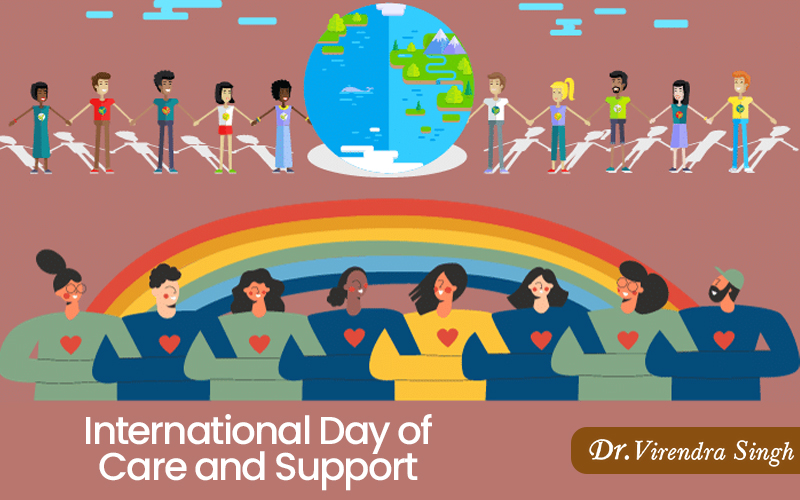
We must face some indisputable facts as we stand at the intersection of a world that is changing. People are living longer, and the number of elderly people worldwide is increasing. This longevity is a cause for celebration, but it also demands our attention regarding the quality of life these individuals experience. The well-being of people and communities is inextricably related to our humanity. We must put the caring connection first in order to maintain this wellness. The United Nations has declared October 29 to be an International Day of Care and Support, which is encouraging. This day serves as a platform to delve deeper into caregiving systems, focusing on the rights of caregivers, be they formal or informal. The core of the care economy is the delicate balancing act of caregiving rights.
Dr. Virendra Singh, a renowned pulmonologist, plays a pivotal role in guiding efforts on the International Day of Care and Support 2024, emphasizing the critical importance of respiratory health in the global care framework. He encourages for improved air quality and has decades of experience treating lung-related disorders. He promotes a humane approach to helping those with long-term respiratory problems.
His observations on early detection, community-based support networks, and preventive care emphasize the necessity of teamwork in the treatment of respiratory illnesses, particularly among susceptible groups. On this day, Dr. Virendra Singh urges people and healthcare systems to put care first, demonstrating how assistance, whether in the form of medical treatments or small deeds of kindness, may significantly enhance the quality of life for people dealing with chronic illnesses.
The Theme for International Day of Care and Support 2024
The Theme for International Day of Care and Support 2024 is “Ageing with Dignity: The Importance of Strengthening Care and Support Systems for Older Persons Worldwide“.
Human Rights-Based Care
The International Day of Care and Support encourages us to take into account the human rights of those who provide care as well as those who receive it. How can we make sure these rights don’t conflict with one another while yet giving them priority?
Gender Responsiveness
Women have historically been responsible for the majority of caregiving duties, making it a gendered issue. This often leads to women delaying or abandoning their own aspirations.
Disability Inclusivity
The United Nations encourages member nations to include disability inclusion in its programs and policies for care. This encompasses a variety of opportunities, ranging from the early phases of raising awareness and comprehending the particular requirements of people with disabilities to the intricate processes of implementation, such as incorporating universal design into facilities for the elderly.
Age Sensitivity
Care and support are required at all stages of life. The severity of these demands varies, though. Every stage of life presents its own set of difficulties, which we must deliberately recognize and deal with.
The Global Perspective
The proportion of South Africa’s population that is elderly has grown from 6.2% to 9.2% in just 20 years, reaching 5.4 million in 2023. The caring dynamic is a component of the larger care economy, which includes all types of caregiving, both paid and unpaid. It’s essential for all of us to consider our roles as both caregivers and care recipients.
Importance of International Day of Care and Support
The International Day of Care and Support is extremely significant because it raises awareness of the vital role that empathy, care, and support play in creating stronger, healthier communities. This day serves as a reminder of the interconnectedness of individuals and the power of collective compassion. It increases awareness of the difficulties experienced by vulnerable groups, including the elderly, the disabled, and people with chronic illnesses, by honoring the efforts of caregivers, medical professionals, and those providing emotional and physical support. Along with encouraging governments, organizations, and communities to enhance care systems, the day also makes sure that everyone has access to the assistance they require.
Some Specific Examples of Activities that You Can do to Observe the International Day of Care and Support
- Participate in a webinar or event organized by a care union or local organization. This is an excellent opportunity to become more knowledgeable about the difficulties that caregivers encounter and to participate in advocacy activities.
- Make a donation or offer your assistance to a charity that helps caregivers and their families. Many organizations offer daycare, financial aid, and legal support, among other crucial services, to caregivers.
- In your letter, ask your elected representatives to back laws that foster an inclusive and resilient care economy. Policies like paid family leave, reasonably priced childcare, and equitable pay for careers are a few examples of this.
- Take some time to express your gratitude to the care and support workers in your life. This could include professional caregivers like nurses, home health aides, and daycare providers, as well as your friends and family who offer unpaid care.
By observing the International Day of Care and Support, we can fight for investments and policies that promote a resilient and inclusive care economy while also bringing attention to the value of care and support labor.
FAQs
What is the International Day of Care and Support?
The purpose of the International Day of Care and Support is to acknowledge and celebrate the value of compassion, understanding, and support in local communities all around the world. It emphasizes how important it is to offer people in need—including caregivers, medical professionals, and people going through different difficulties—emotional, physical, and social assistance.
What is the Theme for International Day of Care and Support 2024?
The Theme for International Day of Care and Support 2024 is “Ageing with Dignity: The Importance of Strengthening Care and Support Systems for Older Persons Worldwide“.
Why is the care and support important?
Care and support are essential for promoting well-being, reducing inequalities, and fostering healthier communities. They offer a basis for social resilience, physical healing, and emotional fortitude, especially for vulnerable groups, the elderly, individuals with impairments, and those who are ill or experiencing hardship.
Who benefits from the International Day of Care and Support?
Numerous people benefit from this day, including those who require care (elderly, disabled, and chronically ill people), as well as family members, caregivers, and medical professionals who offer crucial support. The day serves as an opportunity to recognize their efforts and advocate for better care systems.
How does the International Day of Care and Support impact communities?
The day promotes stronger communities where people feel appreciated and connected by increasing awareness of the benefits of care and support. It promotes teamwork in tackling care-related issues, advancing mental and physical health, and raising everyone’s standard of living.
